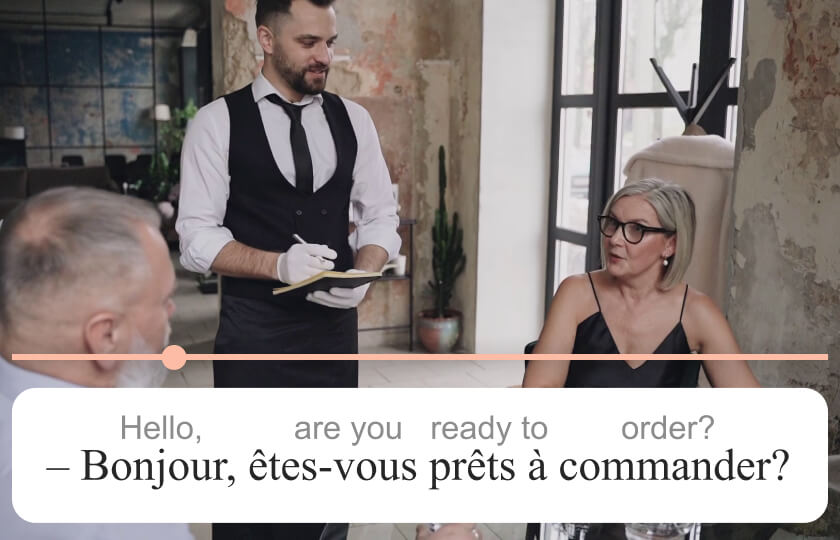
Learning French can be a rewarding but challenging journey, especially if you’re starting from scratch. Whether you’re dreaming of sipping coffee in a Parisian café or planning a trip to Montreal, getting a solid foundation is key. While there’s no magic formula for fluency, some methods can help you learn French quickly and effectively. Let’s go over them.
1. Prioritize useful vocabulary
If you want to learn French fast, focusing on the right vocabulary can make a big difference. Begin with practical words and phrases that you’re most likely to use in everyday situations, like introducing yourself, asking for directions, or ordering a coffee.
Prioritize learning high-frequency words, such as common verbs, nouns, pronouns, as well as basic phrases. For example, être (to be), avoir (to have), je (I), vous (you), merci (thank you), and s’il vous plaît (please).
Learning words in groups by theme, like “food and drink” or “directions”, also makes it easier to remember related vocabulary. Just make sure you learn words in the context of sentences, and you’ll have a much easier time using them in conversation.
2. Pick a good app or course
A good language app or course offers structure, consistency, and motivation, helping you make initial progress without feeling overwhelmed.
Apps like Lilata, Busuu, and Babbel provide easy-to-follow, interactive, bite-sized lessons with gamified elements that keep you coming back. They’re great for building foundational vocabulary and grammar skills.
If you prefer a more traditional approach with real teachers, consider video and audio courses like Learn French with Alexa, Learn French with Vincent, Coffee Break French, or Language Transfer. Some of them are free.
When choosing an app or course, look for one that matches your learning preferences. Do you learn best through repetition, listening, or interactive exercises? The best resource for you will be one that you enjoy using consistently.
3. Immerse yourself in French media
Listening to native speakers and reading in French helps you pick up pronunciation, rhythm, and everyday vocabulary that you won’t encounter in textbooks. For beginners, starting with content made for language learners and children provides a helpful ramp to transition to native-level content and conversations with real people.
You can start with beginner-friendly podcasts like Learn French by Podcast or Cultivate Your French. These break down the language to a level that’s easy to understand, helping you train your ear and build vocabulary.
Books and articles in French are also great learning tools. Children’s books or young adult novels, like Le Petit Prince by Antoine de Saint-Exupéry or the Le Petit Nicolas series, are excellent choices for beginners. If you prefer shorter formats, try simplified news articles, such as those from Le Monde des ados or 1jour1actu.
If you enjoy video-based learning, there are several YouTube channels that teach French immersively, like French Comprehensible Input and Easy French. As you build your vocabulary, you can also start watching popular French TV shows like Lupin or Call My Agent! If they feel too challenging, try watching shows you already know well, but with French audio and subtitles.
4. Master pronunciation basics
French has several unique sounds and pronunciation rules that can be tricky at first, but mastering them will make learning how to speak French much easier.
Start by familiarizing yourself with the French alphabet and its sounds. While the letters are the same as in English, they often sound different, and many have accents that change the way they’re pronounced. Common sounds to focus on include the French r, which is produced in the back of the throat, and nasal vowels, like those in words such as bon or français.
Learning syllable stress and liaison, will also help. In French, stress usually falls on the last syllable of a word or phrase, giving it a distinct rhythm. Liaison, which connects the final consonant of one word to the vowel sound of the next, is another key feature. For example, in les amis (the friends), the s in les is pronounced because it links with the following a sound.
A great way to improve your pronunciation is to listen to native speakers and repeat after them. You can practice with language apps, French podcasts, or YouTube channels that break down pronunciation.
5. Start speaking early
Don’t wait until you feel “ready” to speak French — start speaking as soon as possible, even if you only know a few words or phrases. Try saying simple things to yourself, like greetings or short sentences about your day.
You can even narrate small actions as you do them, like Je mange une pomme (“I’m eating an apple”) or Je vais au travail (“I’m going to work”). This practice helps you get comfortable forming sentences in French without the pressure of speaking to someone else.
If you want to push your speaking skills further, language apps often have speaking exercises where you can record yourself and get immediate feedback on pronunciation. You can also try talking to a language bot, which is a great way to practice conversational basics without the fear of making mistakes.
As you build confidence, try speaking with native speakers or fellow learners. This could be through language exchange platforms or by finding online communities where people practice French together. The key is to practice often and embrace the process — even if you make mistakes, you’ll be learning and progressing with each attempt.
6. Use AI to bridge gaps
AI tools like ChatGPT can provide quick, accessible support to help you understand tricky language concepts and practice conversation whenever you’re ready.
AI can serve as an on-demand tutor for challenging language concepts. If you’re unsure about word order, tenses, or sentence structure, AI can explain these concepts in simple terms. It’s also helpful for identifying where you went wrong when writing or doing exercises.
AI can also work as an interactive conversation partner. You can chat on various topics and get instant feedback. For writing skills, AI can suggest responses, improve phrasing, and correct spelling and grammar. For speaking skills, some AI tools can help with pronunciation, rhythm, and building confidence.
7. Get a tutor or language-exchange partner
Working with an actual person brings real-world interaction into your language routine, helping you build confidence, improve fluency, and get quick feedback.
Tutors are ideal for giving professional, personalized guidance. A good tutor can tailor lessons to your preferences, identify and address your biggest weaknesses, and keep you accountable. Platforms like Italki and Preply can help you find affordable tutors and book lessons when it’s convenient for you.
If a tutor isn’t within your budget, a language-exchange partner is a good alternative. Apps like Tandem and HelloTalk can connect you with native French speakers who want to practice your language. These exchanges are informal, giving you a comfortable space to improve your conversation skills and gain cultural insights without the pressure of formal lessons.
8. Keep notes
Keep a small notebook or a digital notes app handy to jot down new words, phrases, or any tricky grammar points you encounter. Writing things down not only reinforces memory but also creates a quick reference for later.
Organize your notes by themes like “food,” “greetings,” or “common verbs.” This makes it easy to review relevant topics when you need them, and grouping words helps them stick better in your memory. If you’re learning specific phrases for travel, for example, you can create a dedicated section with essential expressions you’ll use often.
Also, try to write down sample sentences using new vocabulary or grammar rules. Seeing words in context makes them easier to remember and gives you examples to use in real conversations.
9. Build a habit
Consistency is key when it comes to learning French. Studying daily, even if it’s just 10-15 minutes, keeps the language fresh in your mind and helps reinforce what you’ve learned.
Start by setting a specific time each day for French practice. It could be during your commute, a lunch break, or before bed — whatever time you can commit to consistently. Short, regular sessions are more effective than cramming, as they build up your language skills gradually and naturally.
Mix up your activities to keep your routine engaging. One day, you could practice vocabulary with flashcards, and on another, listen to a podcast or try a few conversation exercises. Variety prevents burnout and keeps you motivated.
10. Don’t try to be perfect
Accept that you’ll sometimes sound a bit funny, make mistakes, and not always understand everything people say. That’s a completely normal part of learning a language. Aim to be 80% accurate 80% of the time, and you’ll progress much faster than if you get hung up on being perfect, especially early on.
When speaking, focus on getting your ideas across rather than nailing every detail of grammar or pronunciation. Most native speakers will appreciate your effort, even if you slip up here and there. Over time, you’ll pick up on these small mistakes and improve.
It’s also perfectly fine if you don’t catch everything when listening to native speakers or watching French media. Understanding will grow with time and exposure, just be patient.
The important thing is to keep going and remember that each attempt, successful or not, brings you one step closer to fluency.

